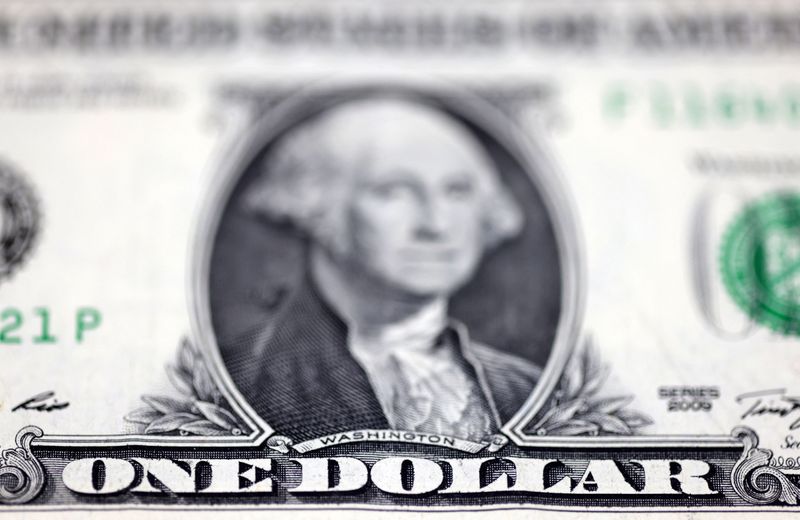Select Language

By Kevin Buckland
TOKYO (Reuters) -The dollar hovered near a one-week high on Thursday following its best day this month against its major peers after minutes of the last Federal Reserve meeting revealed a willingness to raise interest rates among some officials.
The New Zealand dollar continued its climb as an unexpected rise in local retail sales added to hawkish guidance from the central bank a day earlier to push back bets for rate cuts.
Sterling remained firm after jumping to a one-month peak following hotter-than-expected inflation, and also drew support from the announcement of a UK parliamentary election for July 4.
Ether continued to hover near Tuesday's more than two-month peak amid speculation over the potential approval of U.S. spot exchange-traded funds that would track the world's second-biggest cryptocurrency.
The dollar index, which tracks the currency against six major rivals including sterling, the euro and yen, was little changed at 104.85 after gaining 0.28% overnight.
Fed officials at their April 30-May 1 session indicated they still had faith that price pressures would ease, if only slowly, but the meeting summary also reflected discussion of possible tightening.
"The minutes revealed concerns that inflation might not decline as quickly as hoped and that some members are open to further rate hikes if needed," supporting the dollar, James Kniveton, senior corporate FX dealer at Convera, wrote in a note to clients.
"Consequently, expectations for the first rate reduction have shifted from September to November. With the Federal Reserve meeting occurring just after the U.S. elections, early November could see significant market volatility."
The dollar was little changed at 156.755 yen after rising to 156.85 overnight, the highest since May 1, even with traders wary of the risk of intervention by Japanese authorities to support the currency.
Nearly half of Japanese firms find the yen's slide beyond 155 to the dollar harmful to their business, roughly double the percentage of those who see the currency's weakness as a positive, a Reuters survey showed on Thursday.
To counter the yen's slide, 37% of respondents wanted the central bank to raise interest rates again, while 34% wanted the government to intervene in the foreign exchange market.
The euro ticked 0.08% higher to $1.08305, but remained close to the overnight low of $1.08175.
Sterling held its ground at $1.2723, following a surge to as high as $1.27610 on Wednesday for the first time since March 21 as sticky inflation crushed bets for a June cut by the Bank of England.
Meanwhile, Prime Minister Rishi Sunak called a national election, which his Conservatives are widely expected to lose to the opposition Labour Party after 14 years in power.
"A Labour win with prospects of a softer Brexit are GBP+, especially vs EUR," TD Securities analysts wrote in a note.
"However, GBP is likely to trade on this only around the election date as inflation and rate divergence remain the primary FX drivers, especially into first cuts."
The kiwi added 0.4% to $0.6121 after data released Thursday showed that retail sales volumes in New Zealand rose 0.5% in the first quarter, countering expectations for a small drop.
On Wednesday, the Reserve Bank of New Zealand surprised markets by lifting its forecasts for peak interest rates and pushing back when it expects to cut.
Among cryptocurrencies, ether traded at about $3,769, up slightly from the close on Wednesday. It surged as high as $3,838.80 on Tuesday for the first time since March 15.
Bigger rival bitcoin was little changed at $69,432 after reaching $71,957 on Tuesday for the first time since April 9.

